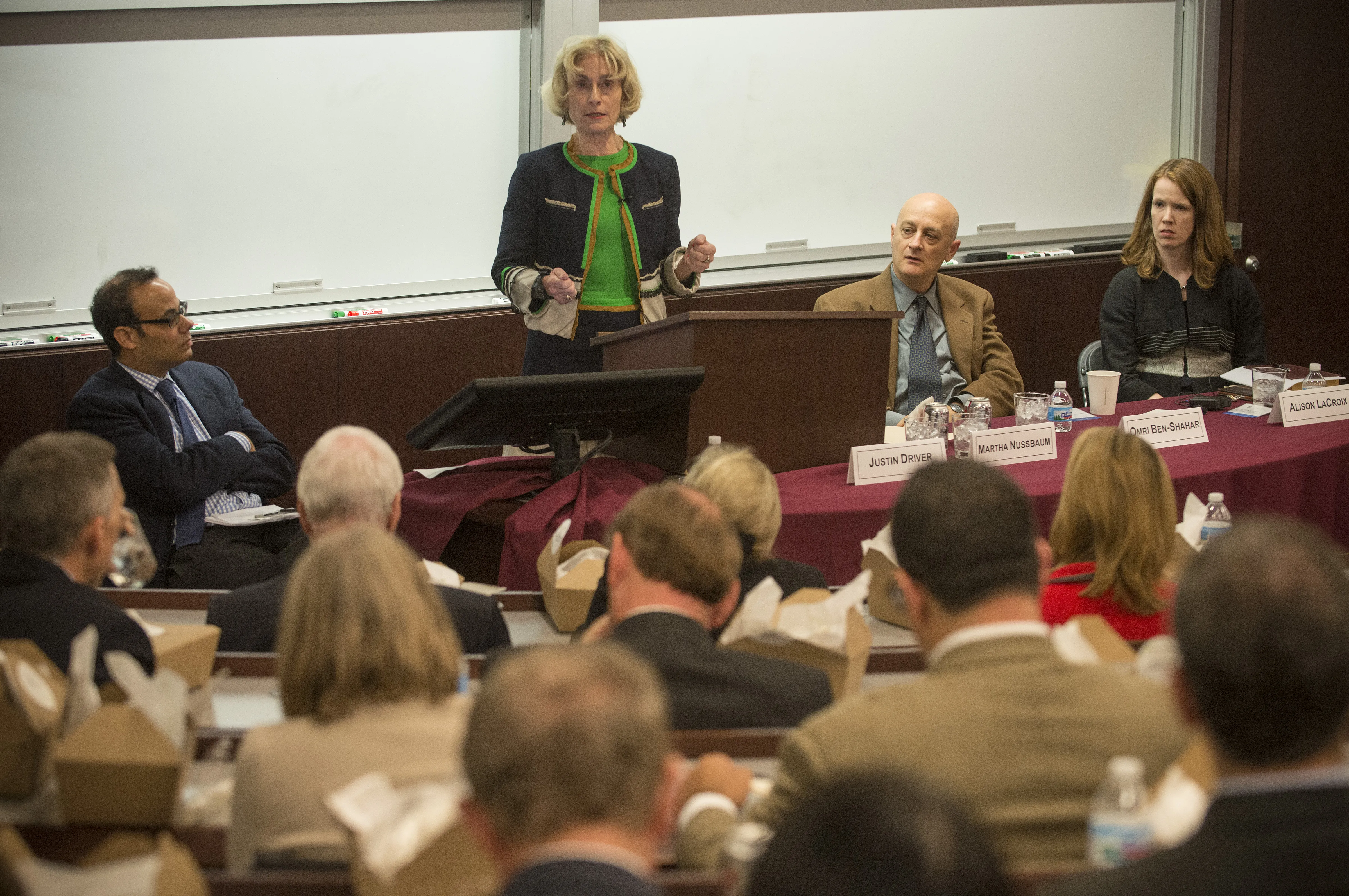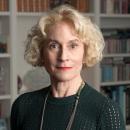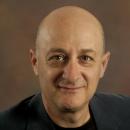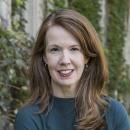Celebrating a Rich Interdisciplinary Tradition

Painting a rich portrait of the Law School’s storied interdisciplinary tradition—from its founding mission to offer more than the “intellectually thin” legal education typical of the day, to the bold ideas of legal historians like William Winslow Crosskey and David Currie, to a future in which law-and-economics scholars will continue to apply statistical analysis in novel ways—Professors Martha C. Nussbaum, Alison LaCroix, and Omri Ben-Shahar helped celebrate the University of Chicago’s 125th anniversary earlier this month with a lively discussion that touched on three signature areas: law and philosophy, legal and constitutional history, and law and economics. The panel was moderated by Professor Justin Driver.
“Lawyers should be independent and critical participants who work to shape a future that is better than the past,” said Nussbaum, the Ernst Freund Distinguished Service Professor of Law and Ethics. “Far more than many nations, ours has in fact realized broad social objectives through lawyers. Both the civil rights movement and the feminist movement offer stirring examples of how lawyers who think outside the box can achieve something great that benefits us all. We have achieved this because of interdisciplinarity—and, I would argue, with the inclusion of philosophy within that.”
The University of Chicago Law School embraced this approach from the beginning, thanks in large part to the scholar for whom Nussbaum’s professorship is named. Freund, an influential German political scientist, legal thinker, and practicing lawyer who was University of Chicago President William Rainey Harper’s chief advisor on law, helped shape the Law School’s mission as a place of robust, multi-tiered inquiry when it was founded in 1902.
“At that time legal education was both thin and narrow—it had little to say about broad social questions, and it didn’t delve into their intellectual foundations,” Nussbaum said. “Freund argued that the University of Chicago should think of a new, richer way of training lawyers for the profession. Our country, he argued, needs lawyers who can think broadly about social issues. He thought that lawyers were crucial thinkers, that they held the key to rational and responsible policymaking.”
This broader approach has meant incorporating the study of history, empirical social science, and normative theories of political ethics and social justice and “pushing the boundaries of justice in new areas, such as race and immigration,” said Nussbaum, who this year is teaching a law and philosophy workshop devoted to examining race from a philosophical and social justice point of view. She also regularly teaches other interdisciplinary courses, including one on global inequality with Professor David A. Weisbach, the Walter J. Blum Professor of Law, that incorporates both economics and philosophical theory.
The interdisciplinary insights of UChicago’s constitutional and legal historians have contributed to a deeper understanding of the law, LaCroix, the Robert Newton Reid Professor of Law, told the audience. She spoke of Andrew McLaughlin, a prolific University of Chicago scholar who in 1936 won the Pulitzer Prize for his magnum opus A Constitutional History of the United States; Crosskey, an early originalist who “stirred a firestorm” by challenging the dominant view that Congress’s power to regulate domestic commerce was limited to interstate activity, a deeply considered position that is still “whispered about” among historians today; and Currie, a beloved Law School professor whose books on constitutional history are still widely read and cited.
Currie, who served on the Law School faculty for 45 years until his death in 2007, was able to reach a broader audience through his work, using his depth of knowledge to frame important issues in an accessible way, LaCroix noted.
“This is a point that connects Crosskey, McLaughlin, and Currie: they were all deeply engaged in the debates of their day, in methodological, substantive, and interpretive debates, and they all aimed their work at reaching a broader, educated public,” LaCroix said. “In all of these we see that constitutional history at the Law School has been vibrant and omnipresent, really going back the beginning of the University. Today, historical approaches to constitutional law are legion and everywhere on the faculty. We have a rich dialog with colleagues across the Midway. There’s a long lineage of viewing history as an interpretive method that sheds light on doctrinal questions.”
Perhaps the best-known interdisciplinary focus has been law and economics, the enormously influential field that began at the Law School in the mid-20th century. During his portion of the panel, Ben-Shahar focused on the discipline’s future, pointing to a recent shift toward applying the analysis of law and economics to outside areas.
“It’s no longer just law and economics,” said Ben-Shahar, the Leo and Eileen Herzel Professor of Law and Kearney Director of the Coase-Sandor Institute for Law and Economics. “It’s law, economics—and something else. It’s about taking the tools of the economic analysis of law and applying it outside the traditional areas.”
Ben-Shahar pointed to the work of Anup Malani, the Lee and Brena Freeman Professor of Law, who since 2010 has been examining the impact of a government-sponsored health insurance program in India on the financial and health outcomes of those who receive benefits. The long-term, randomized study of 12,000 Indian households seeks to contribute insights to debates over the effectiveness of universal health care.
“It becomes a debate not about law and principles, but about actual outcomes,” Ben-Shahar said. “Nothing like this has ever been done: testing in real life—in a randomized study, with the right controls and the right economic statistical methods—what the effects are of health insurance. I find it to be mind-bogglingly interesting and informative.”
Ben-Shahar also pointed to a student’s study of whether judges are affected by their cases, as well as Professor Aziz Huq’s Guantanamo Bay research, which drew on Coase-Sandor’s statistical expertise and analytical capabilities to examine factors influencing how long detainees were held.
“These are the kinds of things before that before could only be hypothesized,” Ben-Shahar said. “Now they can be measured.”
These types of insights might not have been possible without the cross-fertilization of ideas from different disciplines, the scholars argued.
“Interdisciplinary work is an incredibly important part of the University of Chicago Law School,” Driver said. “This has been true historically speaking and is still true today.”


